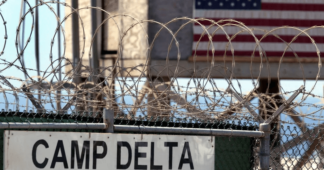by Scott Roehm
June 29, 2023
On June 26 – the International Day in Support of Victims of Torture – the United Nations Special Rapporteur on Human Rights and Counter-Terrorism, released the final report of her technical visit to the United States, which included unprecedented access to the Guantanamo detention facility. The report covers a lot of ground – the rights of victims of terrorism, the rights of detainees at Guantánamo, and the rights of former detainees – and does so in a fair amount of detail. The Special Rapporteur, Fionnuala Ní Aoláin, simultaneously posted the one-page U.S. response.
Here are a few notable takeaways from the report:
Where Credit is Due, and Where It Isn’t
The Special Rapporteur’s report opens by lauding the United States for facilitating her visit to Guantanamo – the first of its kind by any of the U.N. Special Procedures – and rightly so. As I have written previously:
“Breaking with prior administrations on this issue [of access to Guantanamo] reinforces not only the Biden administration’s commitment to closing Guantanamo, but also its respect for the basic principle that all countries must afford U.N. human rights officials independent and meaningful access to all sites of detention, wherever they may be. It is notable that the United States can now, for the first time, credibly state that it has nothing to fear from such a visit. The Biden administration has strengthened the United States’ hand, and that of other democracies, vis-à-vis authoritarian regimes – like China – that have denied access to places of detention on purported security grounds.”
In the Rapporteur’s words:
“The U.S. Government, which has a standing invitation to all thematic Special Procedures mechanisms, understood that this visit would put its detention practices, repatriation and resettlement efforts, and treatment of victims and family members of the 9/11 terrorist attacks under close scrutiny, and it is a sign of a commitment to international law that the visit occurred, was highly cooperative, constructive, and engaged at all levels of government, and is reported upon.”
The U.S. response echoes these sentiments, thanks Ní Aoláin for acknowledging the significance of the access she was given, and commits to carefully reviewing her recommendations.
Unless the response was then going to engage genuinely with the substance of the report (it does not), the administration probably should have just stopped there. Instead, across two sentences – seemingly intended to support the U.S. “commit[ment] to providing safe and humane treatment for detainees at Guantanamo, in full accordance with international and domestic U.S. law” – the response makes a series of conclusory statements, nearly all of which are deeply misleading in some respect.
The U.S. government writes, for example:
“[Detainees] receive specialized medical and psychiatric care…” Yes, there are some detainees who have received some care than can be characterized as “specialized.” But that says nothing about the mountain of evidence that medical care at Guantanamo is deficient in myriad ways (including by lacking torture rehabilitation). That evidence comes from independent medical experts, former Guantanamo commanders, non-governmental organizations, Guantanamo’s first chief medical officer, U.N. special procedures, detainees’ own medical records, journalists, U.S. federal courts, a former SOUTHCOM commander, and – in an exceedingly rare recent public statement – the International Committee of the Red Cross.
Even Congress, which almost never legislates on Guantanamo other than to further entrench it, is expressing concern: the version of this year’s defense authorization bill recently passed out of the Senate Armed Services Committee (by a 24-1 vote) “directs a briefing on the progress of the Department of Defense in contingency planning for addressing the anticipated medical contingencies for the aging population at the Guantanamo detention facility.”
U.S. domestic law requires the government to provide detainees with “evaluation and treatment that is accepted by medical experts and reflected in peer-reviewed medical literature as the appropriate medical approach for a condition, symptoms, illness, or disease and that is widely used by healthcare professionals.” In case, after case, after case, it is clear that the Defense Department isn’t meeting that standard of care.
The United States also states, “[Detainees] [c]ommunicate regularly with family members.” Again, yes, detainees communicate with family members. Whether communication is “regular” – and for whom, since access is different for different categories of detainees – might turn on one’s definition of the word. The Special Rapporteur acknowledges important improvements in access to family communications, including recently. But, as she also explains, communication is one thing, meaningful communication another. To be sure, the administration’s statement reads quite differently with some context. As Ní Aoláin’s report explains:
“Detainees, counsel, and military personnel identified several ongoing obstacles to meaningful family communication, including the lack of confidentiality of family calls, calls that are not in real-time, poor or often last-minute communication with regard to call cancellations and delays, and limited frequency of calls at odds with the actual numbers of remaining detainees…[,] issues concerning the vetting process for family members to be added to the call list, as well as potential limitations placed on “extended” family participation in calls.“
And the U.S. government writes, “The military commission process continues for those detainees subject to criminal prosecution.” This statement is astonishing, not because it’s wrong, but because it concludes a paragraph describing progress the administration has made toward closing Guantanamo, when the commissions’ cockroach-like ability to drag on is one of the biggest obstacles to closure. Throughout almost 15 years of working on Guantanamo, I have never seen anything more universally accepted than the belief that the military commissions have failed. I’m confident that most senior administration officials with a hand in Guantanamo policy feel the same. It should be equally clear at this point that plea agreements are the only way out. Why? Because, as the Special Rapporteur said during her press conference…
“The cost of torture is the annihilation of the rights of victims of terrorism.”
It’s no secret that torture is the rot at the core of the military commissions. Ní Aoláin’s press conference clearly and powerfully captures what that means for 9/11 victims and family members. Here’s how she put it in her report:
“The SR unequivocally states that the systematic rendition and torture at multiple (including black) sites and thereafter at Guantanamo Bay, Cuba—with the entrenched legal and policy practices of occluding and protecting those who ordered, perpetrated, facilitated, supervised, or concealed torture—comprise the single most significant barrier to fulfilling victims’ rights to justice and accountability. In her view, the use of torture was a betrayal of the rights of victims.
Systematic torture cannot be hidden from all of those whose human rights are impacted by its use. The practice of systematic torture goes to the heart of the now available justice for victims. It must be recognized as such.”
This is why there have been so many voices who have called for plea agreements to end the commissions – from former Bush administration Solicitor General Ted Olson, to Senator Dick Durbin (D-Illinois), to both prosecutors and defense counsel in the 9/11 case (whose efforts to negotiate a plea have been stymied by senior administration officials’ inertia), to 14 children and grandchildren of mothers and grandparents killed on 9/11. Not because pleas are the solution that any of them may have wanted in the immediate aftermath of 9/11, but because, 21 years later, they are the only “now available justice.”
Arbitrariness “Pervades” Guantánamo Detention Infrastructure
The Special Rapporteur says “arbitrariness pervades the entirety of the Guantánamo detention infrastructure.” She also states that the U.S. government “is intimately aware of the depth and severity of many detainees’ current physical and psychological harms.” I’m not so sure. Rather, in my experience engaging with a host of government officials over many years, part of the disconnect between the government’s longstanding position that it provides “safe and humane treatment for detainees at Guantanamo” and many stakeholders’ claim to the contrary (mine included) is that too few in the executive branch (or Congress for that matter) appreciate the wide-ranging effects of two decades of untreated torture and related trauma.
One of torture’s often most psychologically damaging features is that the victim can never be certain when it’s coming, what will happen, how long it will last, or who the perpetrators will be. The CIA torture program embraced unpredictability as a means to make victims feel helpless and hopeless. That is why effective torture rehabilitation features giving survivors a sense of control over key features of their rehabilitation context, content, and process; providing them trusted human connections that are consistently available, including regular, predictable access to treatment providers and other trustworthy sources of support; and generally trying to make them feel safe.
What’s more, as the Special Rapporteur observed, for many survivors – especially those who have not received any rehabilitative care – “the dividing line between the past and the present is exceptionally thin—for some non-existent—and their past experiences of torture live with them in the present, without any obvious end in sight…”
The more survivors’ lives are dictated by arbitrary, ever-changing forces beyond their control, the more harm they’re likely to experience. And that’s Guantanamo: as the Special Rapporteur found, “arbitrariness pervades the entirety of the Guantánamo detention infrastructure”—from the substance and implementation of Standard Operating Procedures (when they’re even available) that govern all aspects of life; to counsel access; to the rapidly rotating, and generally poorly trained, guard force, some of whom worked previously at Guantanamo at times when “systematic torture, cruel, inhuman, or degrading treatment were sustained;” to also rapidly rotating medical providers; to family access; to the “range of comfort items and even medicines” that certain lawyers are allowed to bring certain clients; and more.
The U.S. government might believe that it is treating the men safely and humanely, but given their history of torture and lack of rehabilitation, that isn’t what many of them are experiencing.
The Price All Families Have Paid
The Special Rapporteur’s descriptions of her visits with families – both 9/11 victims’ and detainees’ – were the hardest parts of her report for me to read, and I was struck by their similarly. For example, all families have been exposed to, and in many cases are suffering from:
- Instantaneous loss (9/11 victims killed; detainees suddenly disappeared);
- “Gendered fault lines of loss” (most 9/11 victims were men; only men and boys were sent to Guantanamo);
- Widespread, inter-generational trauma, and the absence of adequate support systems (in the case of detainees’ families, no such systems at all):
- “Uncertainty about the fate of family members” (it took time to identify who died on 9/11, and as of September 2021 there were 1,106 victims whose remains had not been found; in some cases, it was more than 15 years before detainees’ families learned their relatives were being held at Guantanamo);
- Helplessness (9/11 victim family members have been asking for justice for two decades, so far to no avail; with respect to release of their loved ones, detainees’ families have been powerless in nearly every respect).
This is yet another example of the breadth and depth of harm that flowed not only from the 9/11 attacks, but also from the Bush administration’s decision to respond by stacking evil upon evil.
In sum, for all of the legitimate good that flows from the Biden administration having facilitated the Special Rapporteur’s visit, to the people whose rights she examined – victims of terrorism, detainees, and former detainees – it’s what happens next that matters most. The administration expressing its “disagree[ment] in significant respects with many factual and legal assertions the Special Rapporteur has made,” isn’t the most promising start. If the United States wants its engagement with the Special Rapporteur truly to reflect “leadership by example” and an “ongoing commitment to upholding human rights,” it needs to grapple openly and honestly with the very serious issues that she identified, and take immediate, concrete steps to address them.
(Editor’s note: Special Rapporteur Fionnuala Ní Aoláin is a member of the Just Security Board of Editors.)
We remind our readers that publication of articles on our site does not mean that we agree with what is written. Our policy is to publish anything which we consider of interest, so as to assist our readers in forming their opinions. Sometimes we even publish articles with which we totally disagree, since we believe it is important for our readers to be informed on as wide a spectrum of views as possible.









